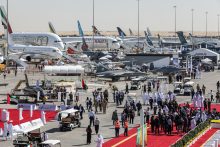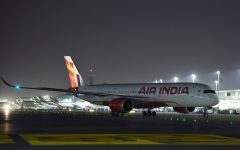 As the aerospace and defence industries continue on their pathways to net zero, this year’s Dubai Airshow will be the ultimate platform for players from across these industries to convene, bringing the latest solutions that will help advance these crucial economic sectors towards a sustainable future. The industries have taken bold steps towards decarbonisation, with innovation accelerating at an exponential rate. As Dubai Airshow leads up to the United Nation’s annual global climate change conference, COP28, which is also taking place in Dubai towards the end of the year, industry stakeholders will take the opportunity to showcase their latest solutions towards net zero emissions, discuss collaborations and gain new insights.
As the aerospace and defence industries continue on their pathways to net zero, this year’s Dubai Airshow will be the ultimate platform for players from across these industries to convene, bringing the latest solutions that will help advance these crucial economic sectors towards a sustainable future. The industries have taken bold steps towards decarbonisation, with innovation accelerating at an exponential rate. As Dubai Airshow leads up to the United Nation’s annual global climate change conference, COP28, which is also taking place in Dubai towards the end of the year, industry stakeholders will take the opportunity to showcase their latest solutions towards net zero emissions, discuss collaborations and gain new insights.
The aviation industry contributes approximately 2% to 3% of all global CO2 emissions but with a constant increase in passenger demand, this could rise to 25% to 30% by 2050 if no actions are taken, according to a new report by Frost & Sullivan titled ‘Sustainable Technologies in Aviation’, which raises the urgency on manufacturers, airlines and airport operators to undertake sustainability initiatives.
Additionally, global production capacity for Sustainable Aviation Fuel (SAF) needs to exceed 30 billion litres by 2030 and 450 billion litres by 2050 for airlines to be able to achieve net zero targets. In 2020, SAF production was just 450 million litres, according to IATA, which is less than 0.05% of the global demand of jet fuel.
However, several initiatives are already underway in the Middle East region. Recently, Abu Dhabi Future Energy Company (Masdar) signed an agreement with Airbus, to support the development and growth of the global SAF market. The agreement will also see the entities collaborate on Green Hydrogen, and Direct Air Capture technologies. Meanwhile, Qatar Airways signed a deal with Shell to source 3,000 metric tonnes of neat SAF at Amsterdam Schiphol airport, making it the first carrier in the Middle East and Africa to procure a large SAF amount in Europe, beyond government SAF mandates.
 Tourism Breaking News
Tourism Breaking News


